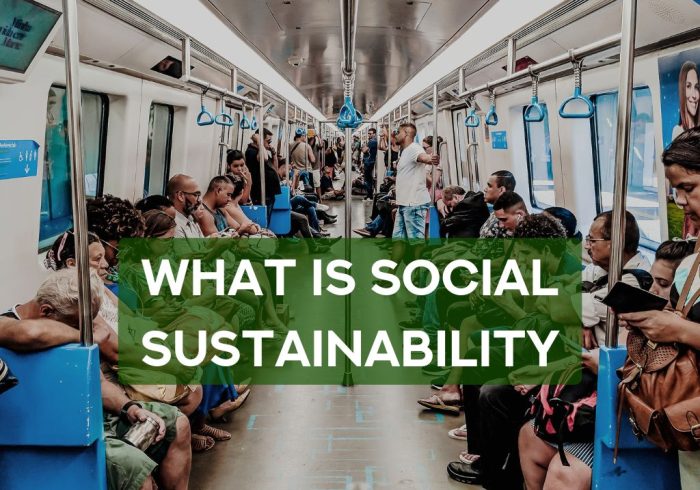Durabilité sociale et impact sur les entreprises
Dans l'environnement actuel des entreprises, qui évolue rapidement, le concept de durabilité a pris une place prépondérante dans tous les domaines. Pourtant, alors que les discussions portent essentiellement sur l'empreinte carbone et les rendements trimestriels, l'élément humain - la durabilité sociale - est tout aussi crucial pour la longévité et le succès.

La durabilité moderne des entreprises repose sur trois dimensions interconnectées : l'environnement, l'économie et la société. Cette approche est souvent résumée par l'expression "les gens, le profit et la planète". Ce principe est réaffirmé dans les normes relatives à l'établissement de rapports sur le développement durable, notamment dans les documents suivants GSE et CSRD.
Et si la durabilité environnementale (protéger la nature) et la durabilité économique (assurer la viabilité commerciale) ont des paramètres relativement évidents, la durabilité sociale fait souvent l'objet de moins d'attention. Cela ne la rend pas moins cruciale pour le développement durable. En fait, bon nombre des Objectifs du Millénaire pour le développement des Nations unies abordent directement la question de la durabilité sociale, y compris des objectifs axés sur l'éradication de la pauvreté (ODD 1), la garantie d'une vie saine (ODD 3), la réalisation d'une éducation de qualité (ODD 4), la promotion de l'égalité des sexes (ODD 5) et la promotion d'un travail décent (ODD 8).
Qu'est-ce que la durabilité sociale ?
Durabilité sociale est définie par les Nations unies comme une mesure du bien-être humain dont l'objectif est de répondre aux besoins socioculturels et spirituels des personnes de manière équitable. Dans le monde des affaires, cela implique d'identifier et de gérer les impacts positifs et négatifs d'une entreprise sur les personnes. Cela concerne les employés, les clients, les travailleurs et les communautés locales tout au long de la chaîne de valeur. Le champ d'application de la durabilité sociale est vaste et aborde de nombreuses questions visant à garantir les besoins des personnes et à favoriser leur bien-être.
- Droits de l'homme et sécurité: Protection des droits de l'homme, de la santé et de la sécurité et lutte contre le racisme et la discrimination.
- Équité et justice:
- Bien-être et développement: L'éducation, l'équilibre entre vie professionnelle et vie privée, le développement communautaire, la lutte contre la pauvreté, les soins de santé et le bien-être des enfants et des personnes âgées.
Pourquoi la durabilité sociale est-elle importante pour les entreprises et la société ?
La durabilité sociale est essentielle car son objectif principal est de permettre aux communautés et aux sociétés de prospérer de manière saine, juste et équitable. Pour les entreprises, se concentrer sur cet aspect garantit une viabilité à long terme.
- Obtenir une licence d'exploitation : Des problèmes sociaux très répandus, tels que la pauvreté et les inégalités, peuvent gravement entraver l'action de l'Union européenne. les opérations commerciales.
- Le moteur de la performance économique : Lorsque les sociétés sont en difficulté, les entreprises le sont aussi. C'est pourquoi le renforcement des efforts en faveur de la durabilité sociale contribue à garantir la pérennité de l'économie européenne. la croissance économique à long terme
- Avantages opérationnels : Des pratiques sociales solides contribuent à retenir et à attirer des partenaires commerciauxElle peut aussi améliorer les relations entre l'entreprise et la collectivité, ce qui réduit les problèmes de gestion des risques. Elle peut également améliorer les relations entre l'entreprise et la communauté, réduisant ainsi les problèmes de gestion des risques.
- Innovation et marchés : Les efforts sociaux peuvent débloquer de nouveaux marchés et stimuler l'innovation pour de nouveaux produits ou lignes de services.
En fin de compte, les efforts qui donnent la priorité à l'équité sociale garantissent que le développement ne se concentre pas uniquement sur la croissance économique et l'environnement, mais aussi sur les personnes qui en sont les artisans.
La durabilité pour la société - Le résultat final
La durabilité environnementale et économique occupe souvent le devant de la scène pour les entreprises qui tentent d'améliorer leurs pratiques de manière responsable. Cependant, l'aspect social de la durabilité est souvent négligé. Garantir le bien-être et l'équité des personnes et des communautés sur lesquelles les entreprises ont un impact est essentiel à leur réussite en matière de durabilité.
Au Carbon CompletePour ce faire, nous abordons le développement durable sous tous les angles afin de trouver des solutions qui tiennent compte de l'ensemble de la situation. Vous avez des questions urgentes sur la manière de gérer la durabilité de votre entreprise ? Nous serions heureux de discuter avec vous de l'amélioration de votre impact - sur le plan social, environnemental et économique.
